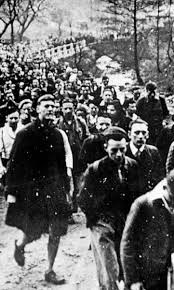The countryside, class and culture

Stuart Cartland looks at the cultural and political representation of topography, at how landscape becomes mythscape, expressing class power and national identity. The painting is Mr and Mrs. Andrews, by Thomas Gainsborough, about 1750
As the fine weather and easing of coronavirus restrictions are upon us, many will be wanting to enjoy the pleasures of the countryside. But beware, the countryside is not a neutral space - are you entering a cultural domain where you are even welcome?
There is nothing natural or even legitimate to the social and cultural exclusivity that the English countryside has come to represent, yet the seemingly timeless narrative of traditionalism and conservatism has become well established cultural tropes. The dominant conservative evocation of Englishness draws heavily from an emotive and evocative imagery based around landscape.
It is an idealised England (and Englishness) which is viewed as both being under attack from and ignored by the marauding forces of modernity and alterity. It is typically rural, middle to upper-middle class, and associated with the south (the basic formulation to understanding the conservative and right-wing position and perspective in regards to Englishness). As Wright elaborates, “it possible to argue that this version of a green and pleasant England persists in the Conservative psyche today. Indeed, the nearer one gets to the grassroots of contemporary Toryism in England, the nearer one gets to this puritanical discourse, and the defensiveness and paranoia that go with it”.
There is clearly nothing political or ideological about the English countryside per se. Indeed, it commands a critical sense of importance to many different and disparate political, social, historical and cultural movements and ideologies such as the Levellers and the Diggers, Orwell, Blake, Morris and the campaign for the right to roam typified by the mass trespass on Kinder Scout, all associated more with the English left, radicalism and socialism. However, it is the hijacking and ideological manipulation of the subject matter, coupled with the constructed and constantly reinforced political and cultural meanings that equate rural England to conservatism and traditionalism.

Kinder Scout Mass Trespass
It is also the attached and attributed symbolism that places a mythological idealised concept of rural England at the heart of conservative and traditional notions of Englishness, which has become synonymous with a sense of English national identity and what it represents. As Mark Perryman highlights, “the temptation to retreat into an unchanging past, a theme park for an old country is strong, offering security versus global risk and the comfort blanket of the familiar”. In a prevailing contemporary climate of crisis, threat, insecurity and uncertainty, such a position has become the dominant, legitimised position.
Cultural and ideological representations of topography are crucial to understanding a conservative discourse of Englishness. A timeless and enduring idolisation of place, culture, class and tradition are bound in a romanticised ‘mythscape’. However, this is one which is man-made and ideologically created. Idealised topographical representations articulate a moral and national narrative which relates to the present. This draws upon national anxieties and contributes towards an illusory sense of hegemony in an age of rapidly changing boundaries and realities.
Landscape can be viewed as the location of ideological clashes of fantasy, desire and anxiety. The conservative and traditionalist mythscape plays upon concepts of the North of England as symbolising the stereotypical working-class, industrial cityscapes whilst the South representing a middle and upper-class idyll of English country gardens. The timeless pastoral green dream of tranquillity and social order however is an illusion, often imposed to obscure what we actually see or encounter. As Robert MacFarlane (2015) describes it, this can be called ‘landscape culture’. It is an idealised notion of ‘dwelling’, ‘belonging’ and ‘heritage’ that needs to be seen through the “turbulence of England in the era of late capitalism”.
A contemporary period foisting such ‘alien’ ideas as political correctness or multiculturalism, challenging ‘our’ sovereignty and ignoring the interests of the moral majority. It forms the raison-de-etre to political campaigns and movements such as the Campaign for an English Parliament, UKIP and the English Democrats. The English countryside as an elite ideological domain resonates with conservative traditionalists not because it draws upon an exhaustive list of characterisations but rather an attitude.
This defensive definition of Englishness is formulated through a bitter awareness that the world is charging headlong in the opposite direction. It is a defensive narrative of retreat and denial. The English countryside has become symbolic as a last-ditch effort to defend against encroaching modern forces. This can be seen in the contemporary context by traditionalist concepts of Englishness against issues such as gay marriage, the banning of blood sports, environmental concerns, and gender equality.
The countryside has played an important part in the English imagination particularly since the Industrial Revolution. The origins of conservative traditionalism linked to the countryside can be traced throughout modern English social and cultural history, from Cobbett’s ‘rural rides’ in the 1820s to the popularity of the National Trust after the Second World War. Specific examples typify such a conceptualisation of a romantic and nostalgic England which feeds into contemporary politicised (and often reimagined and manipulated) notions. For example, Edmund Burke’s ‘Little Platoons’ in his ‘Reflections on the Revolution in France’ (1790) and the social and cultural reactionary conservatism not only in regards to the perceived threat of foreign political revolutionary fervour but the political and ideological anti-establishmentarianism contained within such a threat.
William Blake’s ‘Jerusalem’ (set to music by Parry in 1915), is a direct antithesis to the dark, gritty, industrialised cities of the Midlands and the North of England. William Morris’s notion of a future, rural utopia in ‘News from Nowhere’ (1890), with the banishment of industrialised city living to the history books. Rudyard Kipling’s idealised Sussex of ‘Puck of Pook’s Hill’ (1917) and the wider idea of a, “psychological retreat to the English countryside” (Marsden, 2000:26) to a rural England in contrast to the mechanised and industrialised warfare of the first and second world wars. Stanley Baldwin’s (1924) ‘long shadows on country grounds, warm beer, invincible green suburbs, dog lovers and pool fillers’. George Orwell’s ‘Lion and the Unicorn’ (1941) of ‘old maids cycling to Holy Communion through the morning mist’, and G.K Chesterton’s famous lines, “smile at us, pay us, pass us but do not quite forget. For we are the people of England, that never have spoken yet”.
The English countryside has become synonymous with representations of conservationism which have often led to cultural conservatism. This has created a rural nostalgia culture industry of country dwellers clad in Barbour jackets and Hunter wellies, with Range Rovers and barn conversions, steeped in the cultural and political domain of the Cotswoldian elite rolling around in pastoral clichés. It is an England represented as a historicised rural idyll, embodied by a sense of timeless and naturalised tradition and place. Victorian poets and writers (Wordsworth and Coleridge), artists (Turner and Constable) and composers (Elgar, and latterly Britten) all employed to help perpetuate this ideologically evocative version of a decidedly green and pleasant land.
The countryside has firmly become established within contemporary English culture as the cultural domain of the middle and upper classes, where they play the role or act as the only legitimate form of authority, expression and belonging. These roles refer to assumed norms of deference to the conservative ‘country folk’ where feudalism never really went away. The countryside represents the domain of the wealthy, who literally buy into an idealised and sanitised ‘escape to the country’ of chocolate box images of quaint villages and a bucolic escape from ethnic minorities, multiculturalism, political correctness, the Labour Party, council estates, Primark and the like. Indeed this can be understood through the almost impossible task of trying to find a pub in the country that hasn’t been converted into the most ubiquitous form of contrived exclusivity - the gastropub.
These aren’t just pubs catering to the wealthy elite who escape to the country for weekend leisure pursuits of animal abuse, but rather operate as a means to sell the lifestyle choice - that to patronise their establishment you are or can become one of them, part of the country elite, and so inhabit and experience this mythscape of upper-class country lifestyle.
Nevertheless, these are largely superficial expressions of ideology repackaged and resold as lifestyle choice. Doubtless, the countryside can be a pleasant place of rolling hills and blue skies, and by and large it is not an exclusive domain full of Tories. But that is the point - it has been commandeered through the cultural domain as such… so as you venture out after the lockdown, good luck with finding a pub that hasn’t been converted into a shrine to this particular form of cultural hegemony!

Stuart Cartland
Dr. Stuart Cartland is a teaching Fellow at Sussex uni.
Latest from Stuart Cartland
- From citizen to consumer: the growing corporatisation of public space
- Conditioning the national discourse: self-censorship at the BBC
- Same old same old: Downton Abbey and the reactionary construction of exclusive Englishness
- Statues, Context and Historical Narrative: Statues Glorifying Colonialism are a Bad Idea!
- Cancel Enid Blyton! The familiar, tired tropes of GB News and anti-Woke media
